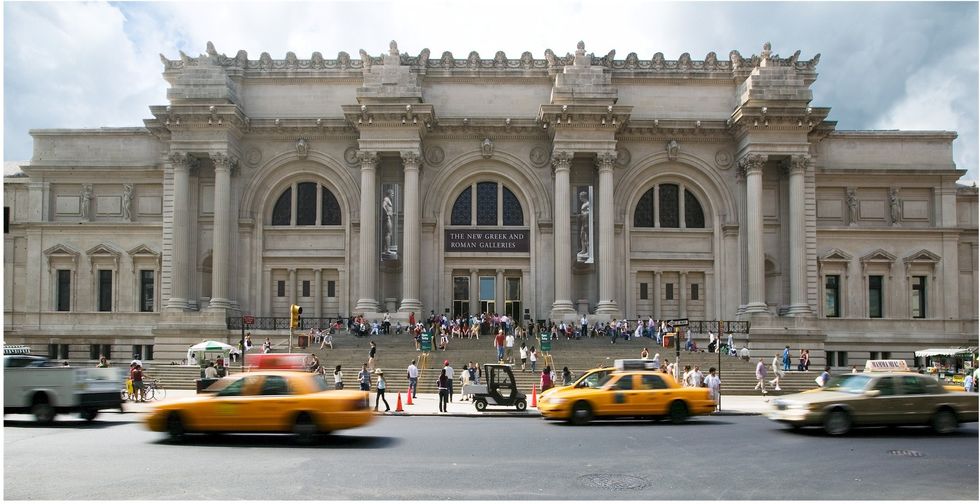As a student at a New York City public school, I have little to complain about. My tuition is light (and soon to be free), I have free access to the New York Times, my own extensive library, and free access to most of New York City’s museums— The Metropolitan Museum of Art included.
Also as a student at a New York City public school, I feel vehemently about the privatization of things; healthcare and business and education and now art among them. Art was, for a very long time, a privilege for many people. Being able to study art and literature was, for quite some time, part of an education which was, for many, inaccessible. That is why it was so great that the Met was, for so long, free.
It was a safe haven for those who didn’t have the money for the MoMA and who were eager to experience art and culture firsthand. It was a place to get lost on a rainy day, with each exhibit leading to another and suddenly you’ve spent two hours staring at nineteenth-century furniture. Just over seven million people visited the Met last year, with numbers climbing from four million in 2007. The numbers keep rising, and for any particular business, you might assume prices would rise with it. But that was the charm of the Met, it wasn't a business— it was a museum and a place of learning, no different than a library. That is, until last week.
I heard the news while sitting on the subway, eating a granola bar. The train had come to a stop— 23rd street or so— and my phone buzzed not once, or twice, but three times as it gained just enough signal to send the news through. After half a century of free admission, the Metropolitan Museum of Art was going to charge a mandatory admission for most out-of-state visitors. I am not so much bothered by the mandatory charge as the reasons for having to charge it: poor government funding, and with the cited influx in people attending, a paralleling influx in people not paying the twenty-five dollars as suggested.
As someone who lives and works and goes to school in Manhattan, but did not always, I can understand paying less than expected if you frequent the city or if you come with a large family because art should never be something that is “too expensive” to see. But it is our individual duty to keep museums like the Met alive, much as it was our duty to keep shopping malls alive and look what happened.
Making sure people understand the importance of art, and especially the publicization of art, is crucial in keeping its value alive. Part of the reason the Metropolitan Museum of Art is so heavily visited is that it is so easily accessible. Part of the reason that I’m cool with paying so much in New York taxes is that I know it's going towards paying for public education and improvements to public access services.
However, to find that people come from all over and just 17% pay the full price is, well, annoying, because while I may go three times in a semester or ten times in a year, some people come only once or twice in their lifetime— so why not pay the full price? Why not value the art that you’ve come all this way to see? Why not act in a way which will benefit the life of the Met for years to come, so that your children and their children can come to New York and see all that the Met has to offer? In this way, I almost understand why they’re charging the $25, though I wish it could have worked out differently.
It is not the people who are fully to blame for this new rule because if it was I have faith that the Met would have found a way around it. Instead it is the funding, or the lack thereof, by the government, which is the main reason for the mandatory admission charge. As aforementioned I’m big on all things public and accessible. I stand by my school for giving its in-state students free admission, and I stood by Bernie Sanders all those years ago— to summarize my political beliefs. I could spend hours talking about private schools and taxes and where do they go, but I’ll save that rant for an article on why the public schools in America need not fall by the wayside.
Art goes hand-in-hand with public education. Art is history, art is understanding, art is empathy. When you enter the Met you become a student, a pupil of the arts, if only for a few hours. With the right mindset, you leave there feeling in some way changed and in some way, a little smarter. The first time I went to the Met I was in awe— I spent nearly an hour alone in the post-impressionist gallery. I had learned about these guys in my Art History class; I had studied their history and their families and why they chose the subjects they did. So to see the art in person, to be able to access all that I had admired for little to nothing in cost, was so satisfying.
If you’re asking me, that’s also the way education should feel: rewarding.
The government, the powers that be, so often does not treat art and the education of art with value, and it's something that is reflective in the lackluster attitude with which they treat the Met’s funding. Budget cuts, budget cuts, and more budget cuts are ultimately what is to be blamed for the cost of admission. It’s comparable to the way that we treat American public schools, constantly cutting the budget for programs until eventually either students suffer or they pay to get their education.It’s indicative of the selfishness of the government, and the poor way in which they treat the arts and the great way in which they treat the one percent. Those who can afford will remain, and those who cannot will be dropped off on the curb. It’s painful to watch, but it serves as a reminder that in order to keep these public areas alive, we cannot be another bystander on the pie chart of those who pay and those who don’t. We have to speak up.



 Photo by
Photo by  Photo by
Photo by  Photo by
Photo by 










 Photo by
Photo by 
 Photo by
Photo by 

 Photo by
Photo by  Photo by
Photo by  Photo by
Photo by 










